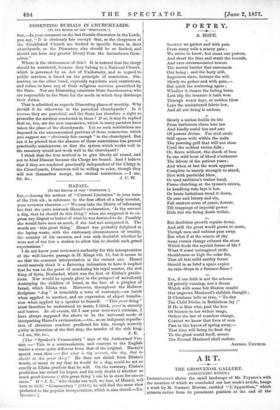DISSENTING BURIALS IN CHURCHYARDS. [TO THE EDITOR OF TUB "SPECTATOR. " ]
SIR,—In your comment on the last Burials discussion in the Lords, you say, " It is obviously fair enough that, as the clergymen of the Established Church are limited to specific forms in their churchyards, so the Dissenters also should be so limited, and should not have any greater liberty than the incumbents them- selves."
Where is the obviousness of this? It is natural that the clergy should be restricted, because they belong to a National Church, which is governed by an Act of Uniformity, and in regard to public services, is based on the principle of restriction. Dis- senters, on the other hand, expressly repudiate such restrictions, and refuse to have any of their religious services prescribed by the State. Nor are Dissenting ministers State functionaries, who are responsible to the State for the mode in which they discharge their duties.
That is admitted as regards Dissenting places of worship. Why
should it be otherwise in the parochial churchyards? Is it because they are parochial, and the State has therefore a right to prescribe the services conducted in them ? If so, it may be replied that so, too, are the new cemeteries, which in many parishes have taken the place of the churchyards. Yet no such restrictions are imposed in the unconsecrated portions of those cemeteries, which you suggest are " obviously fair enough " in the churchyard. But can it be proved that the absence of those restrictions has proved practically mischievous, or that the system which works well in the cemetery would not work well in the churchyard ?
I think that the true method is to give liberty all round, and not to bind Dissent because the Clergy are bound. And I believe that if they are rendered practically independent of the Clergy in the Churchyards, Dissenters will be willing to relax, though they will not themselves accept, the clerical restrictions. —I am,


































 Previous page
Previous page